-
 Bitcoin
Bitcoin $107,443.3008
-1.17% -
 Ethereum
Ethereum $2,494.2503
-0.63% -
 Tether USDt
Tether USDt $1.0003
0.00% -
 XRP
XRP $2.2496
2.23% -
 BNB
BNB $658.7569
0.63% -
 Solana
Solana $154.9826
1.94% -
 USDC
USDC $1.0000
0.01% -
 TRON
TRON $0.2799
1.07% -
 Dogecoin
Dogecoin $0.1659
-1.78% -
 Cardano
Cardano $0.5745
0.25% -
 Hyperliquid
Hyperliquid $39.7005
0.13% -
 Bitcoin Cash
Bitcoin Cash $519.5989
3.78% -
 Sui
Sui $2.7874
-2.40% -
 Chainlink
Chainlink $13.3762
-1.69% -
 UNUS SED LEO
UNUS SED LEO $9.0784
-0.64% -
 Avalanche
Avalanche $17.9846
-2.81% -
 Stellar
Stellar $0.2390
-0.06% -
 Toncoin
Toncoin $2.9028
0.25% -
 Shiba Inu
Shiba Inu $0.0...01147
-2.17% -
 Litecoin
Litecoin $86.6956
-1.27% -
 Hedera
Hedera $0.1508
-0.50% -
 Monero
Monero $322.6222
3.26% -
 Polkadot
Polkadot $3.4124
-2.99% -
 Dai
Dai $0.9999
0.00% -
 Bitget Token
Bitget Token $4.5434
-1.97% -
 Ethena USDe
Ethena USDe $1.0002
0.00% -
 Uniswap
Uniswap $7.1562
-2.61% -
 Aave
Aave $275.8830
-1.02% -
 Pepe
Pepe $0.0...09790
-4.04% -
 Pi
Pi $0.5018
-5.09%
Blockchain wallet security comparison: the difference between hot wallets and cold wallets
Hot wallets are ideal for frequent crypto transactions but are more vulnerable to hacks, while cold wallets offer superior security for long-term storage.
Apr 05, 2025 at 04:07 am
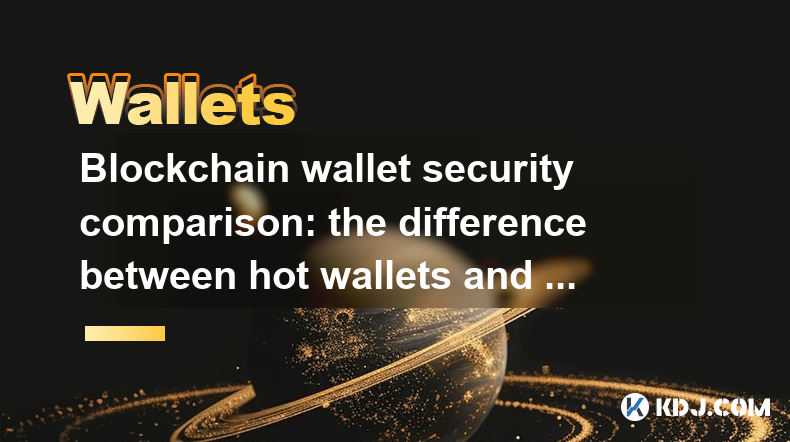
In the world of cryptocurrencies, securing your digital assets is paramount. One of the primary ways to manage your cryptocurrencies is through blockchain wallets, which come in two main types: hot wallets and cold wallets. Understanding the differences between these two types of wallets is crucial for anyone looking to safeguard their investments. This article will delve into a comprehensive comparison of hot and cold wallets, focusing on their security aspects, functionality, and use cases. By the end, you'll have a clearer understanding of which wallet type might be best suited for your needs.
What are Hot Wallets?
Hot wallets are digital cryptocurrency wallets that are connected to the internet. They are designed for frequent transactions and are typically used for everyday spending or trading. Hot wallets can be accessed through various devices such as smartphones, tablets, and computers. They are often provided by cryptocurrency exchanges or as standalone software applications. The convenience of hot wallets comes at a cost, as they are more vulnerable to hacking and cyber attacks due to their online nature.
Security Features of Hot Wallets
Hot wallets offer several security features to protect users' assets, though they are not as robust as those of cold wallets. Here are some common security measures found in hot wallets:
- Two-Factor Authentication (2FA): This adds an extra layer of security by requiring a secondary form of verification, such as a text message or an authentication app, to access the wallet.
- Encryption: Hot wallets often use encryption to protect the private keys stored on the device.
- Multi-Signature (Multi-Sig) Wallets: These require multiple signatures or approvals before a transaction can be executed, adding an additional layer of security.
- Regular Software Updates: Wallet providers frequently update their software to patch vulnerabilities and enhance security.
Despite these measures, hot wallets remain more susceptible to cyber threats due to their constant internet connectivity.
Use Cases for Hot Wallets
Hot wallets are ideal for users who need to frequently access their cryptocurrencies. Here are some common use cases:
- Daily Transactions: If you use cryptocurrencies for everyday purchases, a hot wallet is convenient for quick and easy access.
- Trading: Traders often use hot wallets to quickly move funds between different exchanges or trading platforms.
- Small Amounts: Keeping small amounts of cryptocurrencies in a hot wallet can be practical for minor transactions without exposing larger sums to risk.
What are Cold Wallets?
Cold wallets, on the other hand, are offline storage solutions for cryptocurrencies. They are not connected to the internet, which significantly reduces the risk of hacking and cyber attacks. Cold wallets come in various forms, including hardware wallets, paper wallets, and even physical coins. They are designed for long-term storage and are considered the most secure way to store large amounts of cryptocurrencies.
Security Features of Cold Wallets
Cold wallets boast superior security features compared to hot wallets. Here are some key security aspects of cold wallets:
- Offline Storage: Since cold wallets are not connected to the internet, they are immune to online hacking attempts.
- Physical Security: Hardware wallets, a type of cold wallet, often require physical interaction to authorize transactions, adding an extra layer of security.
- Seed Phrases: Cold wallets typically use seed phrases, which are a series of words that can be used to recover the wallet if the device is lost or damaged.
- Tamper-Proof Design: Many hardware wallets are designed to be tamper-proof, making it difficult for malicious actors to access the private keys.
These features make cold wallets the preferred choice for those looking to store large amounts of cryptocurrencies securely.
Use Cases for Cold Wallets
Cold wallets are best suited for users who prioritize security over convenience. Here are some common use cases:
- Long-Term Storage: If you plan to hold onto your cryptocurrencies for an extended period, a cold wallet is the safest option.
- Large Amounts: Storing large sums of cryptocurrencies in a cold wallet minimizes the risk of theft.
- Inheritance Planning: Cold wallets can be used to securely pass on cryptocurrencies to heirs, as the seed phrase can be stored in a safe place.
Comparing Security: Hot Wallets vs. Cold Wallets
When comparing the security of hot and cold wallets, it's essential to consider several factors. Here's a detailed comparison:
- Internet Connectivity: Hot wallets are connected to the internet, making them more vulnerable to hacking. Cold wallets, being offline, are immune to online threats.
- Ease of Access: Hot wallets are easier to access and use for frequent transactions, but this convenience comes with increased risk. Cold wallets require more effort to use but offer superior security.
- Private Key Storage: Hot wallets store private keys on internet-connected devices, which can be compromised. Cold wallets keep private keys offline, significantly reducing the risk of unauthorized access.
- Recovery Options: Both types of wallets offer recovery options, but cold wallets often use seed phrases, which are more secure than the recovery methods used by hot wallets.
Choosing Between Hot and Cold Wallets
Deciding between a hot and a cold wallet depends on your specific needs and risk tolerance. Here are some considerations to help you choose:
- Frequency of Use: If you need to access your cryptocurrencies frequently, a hot wallet might be more suitable. For long-term storage, a cold wallet is the better choice.
- Amount of Cryptocurrency: If you're dealing with small amounts, a hot wallet may suffice. For larger sums, a cold wallet is recommended.
- Security vs. Convenience: If security is your top priority, opt for a cold wallet. If you value convenience and ease of use, a hot wallet might be more appropriate.
Hybrid Solutions: Combining Hot and Cold Wallets
Some users opt for a hybrid approach, using both hot and cold wallets to balance security and convenience. Here's how you can implement a hybrid solution:
- Primary Storage in Cold Wallet: Keep the majority of your cryptocurrencies in a cold wallet for long-term security.
- Small Amounts in Hot Wallet: Use a hot wallet for small amounts that you need to access frequently.
- Regular Transfers: Periodically transfer funds from your cold wallet to your hot wallet as needed, minimizing the amount of time your cryptocurrencies are exposed to online risks.
This approach allows you to enjoy the benefits of both types of wallets while mitigating their respective drawbacks.
Common Security Practices for Both Wallets
Regardless of whether you choose a hot or cold wallet, there are several best practices you can follow to enhance security:
- Use Strong Passwords: Always use strong, unique passwords for your wallets and enable 2FA where possible.
- Regular Backups: Regularly back up your wallet data, especially for cold wallets, to ensure you can recover your funds if the device is lost or damaged.
- Keep Software Updated: For hot wallets, keep the software updated to protect against known vulnerabilities.
- Beware of Phishing: Be cautious of phishing attempts that try to trick you into revealing your private keys or seed phrases.
- Physical Security: For cold wallets, store them in a secure location, such as a safe or a secure deposit box.
The Future of Wallet Security
As the cryptocurrency industry continues to evolve, so too will the security measures of blockchain wallets. Innovations such as biometric authentication, quantum-resistant encryption, and decentralized identity solutions are on the horizon. These advancements promise to further enhance the security of both hot and cold wallets, making them even more resilient against emerging threats.
Frequently Asked Questions
Q: What is the main difference between hot and cold wallets?
A: The main difference lies in their connectivity to the internet. Hot wallets are connected to the internet, making them suitable for frequent transactions but more vulnerable to hacking. Cold wallets are offline, offering superior security for long-term storage but less convenience for everyday use.
Q: Can I use both hot and cold wallets together?
A: Yes, many users adopt a hybrid approach, using a cold wallet for long-term storage and a hot wallet for smaller, more frequent transactions. This balances security and convenience.
Q: How do I choose between a hot and a cold wallet?
A: Consider your frequency of use, the amount of cryptocurrency you're dealing with, and your priorities regarding security versus convenience. If you need frequent access and are dealing with smaller amounts, a hot wallet might be suitable. For long-term storage and larger sums, a cold wallet is recommended.
Q: What are some common security features of hot wallets?
A: Common security features of hot wallets include two-factor authentication, encryption, multi-signature requirements, and regular software updates to patch vulnerabilities.
Q: What are the security benefits of using a cold wallet?
A: Cold wallets offer offline storage, physical security measures, seed phrases for recovery, and tamper-proof designs, making them highly secure against hacking and cyber attacks.
Q: How can I enhance the security of my blockchain wallet?
A: Use strong passwords, enable two-factor authentication, regularly back up your wallet data, keep software updated, be wary of phishing attempts, and store cold wallets in secure locations.
Q: What future innovations might improve wallet security?
A: Future innovations such as biometric authentication, quantum-resistant encryption, and decentralized identity solutions are expected to enhance the security of blockchain wallets further.
Disclaimer:info@kdj.com
The information provided is not trading advice. kdj.com does not assume any responsibility for any investments made based on the information provided in this article. Cryptocurrencies are highly volatile and it is highly recommended that you invest with caution after thorough research!
If you believe that the content used on this website infringes your copyright, please contact us immediately (info@kdj.com) and we will delete it promptly.
- Bitcoin, Bitfinex, and Acceleration: Decoding the Crypto Crossroads
- 2025-07-01 12:50:11
- SOL, XRP, LTC ETFs: Are We on the Cusp of Crypto History?
- 2025-07-01 12:50:11
- BNB Chain's Maxwell Upgrade: Sub-Second Blocks and a Whole Lotta Speed!
- 2025-07-01 13:10:12
- Bitcoin, Ethereum, Crypto Decline? Nah, Just a New York Minute!
- 2025-07-01 13:10:12
- Coinpass: The Gold-Standard Crypto Platform for UK Businesses
- 2025-07-01 12:30:12
- Tokenized ETFs, Robinhood, and Europe: A New Era of Finance?
- 2025-07-01 12:30:12
Related knowledge
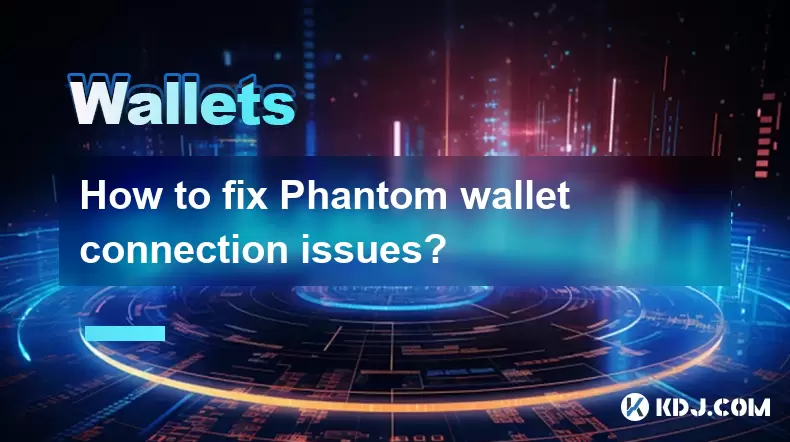
How to fix Phantom wallet connection issues?
Jul 01,2025 at 02:21pm
Understanding Phantom Wallet Connection IssuesPhantom wallet is one of the most popular non-custodial wallets for interacting with Solana-based decentralized applications (dApps). However, users occasionally face connection problems when trying to link their wallet to a dApp or platform. These issues can manifest as error messages, failed connection att...
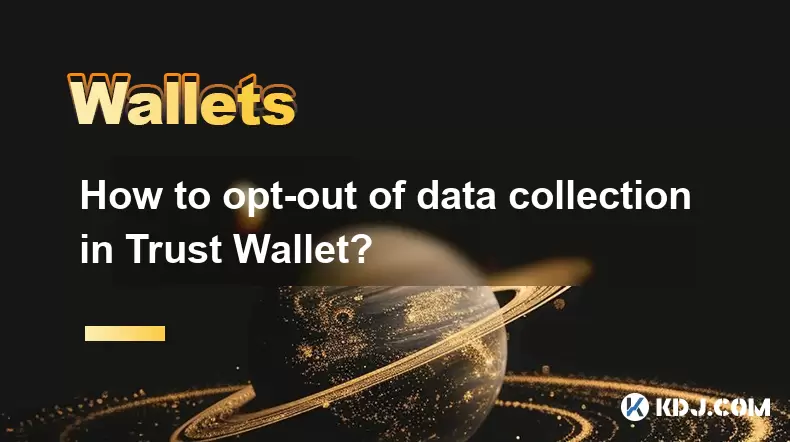
How to opt-out of data collection in Trust Wallet?
Jul 01,2025 at 12:22pm
Understanding Data Collection in Trust WalletTrust Wallet, a popular mobile cryptocurrency wallet, collects certain types of data to enhance user experience and ensure the security of transactions. This data may include device information, usage patterns, crash reports, and anonymous analytics. While Trust Wallet emphasizes that it does not store privat...
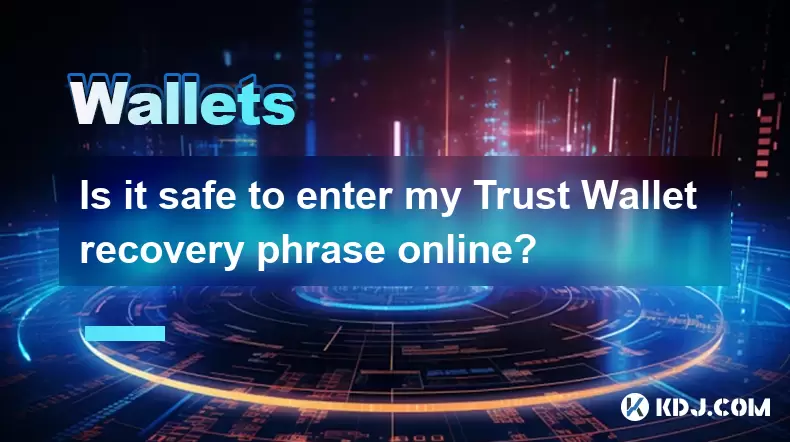
Is it safe to enter my Trust Wallet recovery phrase online?
Jul 01,2025 at 11:42am
Understanding the Role of a Recovery Phrase in Trust WalletA recovery phrase, also known as a seed phrase, is a sequence of 12 or 24 words generated during the initial setup of your Trust Wallet. This phrase acts as the ultimate backup to your wallet and grants access to all your funds stored within it. It is essentially the master key to your digital a...
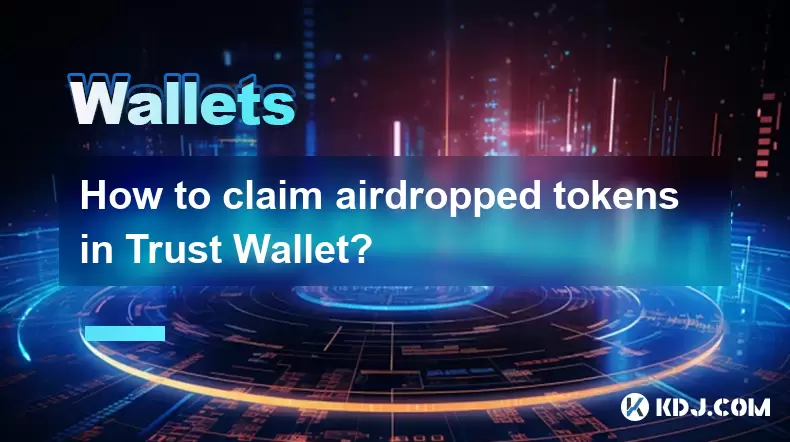
How to claim airdropped tokens in Trust Wallet?
Jul 01,2025 at 12:29pm
What Is an Airdropped Token?An airdropped token is a type of cryptocurrency distributed for free to wallet addresses, often as part of a marketing strategy or blockchain project launch. These tokens are typically sent automatically to eligible wallets or require users to complete certain tasks before claiming them. Trust Wallet, being one of the most wi...
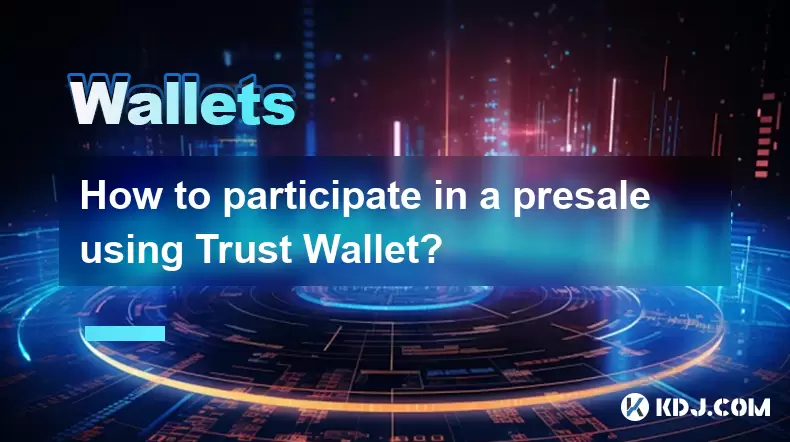
How to participate in a presale using Trust Wallet?
Jul 01,2025 at 01:35pm
What is a Presale in the Cryptocurrency Space?In the cryptocurrency industry, a presale refers to an early fundraising round where projects sell their tokens to a limited number of investors before launching on public exchanges. These events often offer discounted token prices and are considered high-risk due to the speculative nature of new blockchain ...
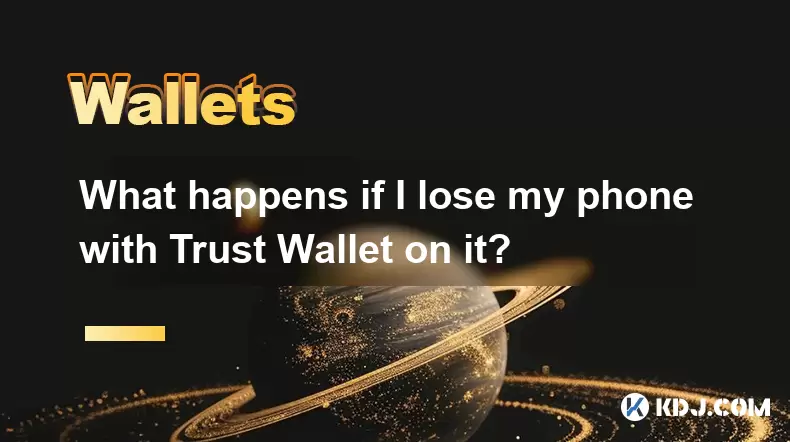
What happens if I lose my phone with Trust Wallet on it?
Jul 01,2025 at 10:03am
Understanding the Risks of Losing Your Phone with Trust WalletLosing your phone can be a stressful experience, especially if you use it to store digital assets through apps like Trust Wallet. The private keys and recovery phrases stored on your device are critical for accessing your cryptocurrencies, and losing access to them could result in permanent l...

How to fix Phantom wallet connection issues?
Jul 01,2025 at 02:21pm
Understanding Phantom Wallet Connection IssuesPhantom wallet is one of the most popular non-custodial wallets for interacting with Solana-based decentralized applications (dApps). However, users occasionally face connection problems when trying to link their wallet to a dApp or platform. These issues can manifest as error messages, failed connection att...

How to opt-out of data collection in Trust Wallet?
Jul 01,2025 at 12:22pm
Understanding Data Collection in Trust WalletTrust Wallet, a popular mobile cryptocurrency wallet, collects certain types of data to enhance user experience and ensure the security of transactions. This data may include device information, usage patterns, crash reports, and anonymous analytics. While Trust Wallet emphasizes that it does not store privat...

Is it safe to enter my Trust Wallet recovery phrase online?
Jul 01,2025 at 11:42am
Understanding the Role of a Recovery Phrase in Trust WalletA recovery phrase, also known as a seed phrase, is a sequence of 12 or 24 words generated during the initial setup of your Trust Wallet. This phrase acts as the ultimate backup to your wallet and grants access to all your funds stored within it. It is essentially the master key to your digital a...

How to claim airdropped tokens in Trust Wallet?
Jul 01,2025 at 12:29pm
What Is an Airdropped Token?An airdropped token is a type of cryptocurrency distributed for free to wallet addresses, often as part of a marketing strategy or blockchain project launch. These tokens are typically sent automatically to eligible wallets or require users to complete certain tasks before claiming them. Trust Wallet, being one of the most wi...

How to participate in a presale using Trust Wallet?
Jul 01,2025 at 01:35pm
What is a Presale in the Cryptocurrency Space?In the cryptocurrency industry, a presale refers to an early fundraising round where projects sell their tokens to a limited number of investors before launching on public exchanges. These events often offer discounted token prices and are considered high-risk due to the speculative nature of new blockchain ...

What happens if I lose my phone with Trust Wallet on it?
Jul 01,2025 at 10:03am
Understanding the Risks of Losing Your Phone with Trust WalletLosing your phone can be a stressful experience, especially if you use it to store digital assets through apps like Trust Wallet. The private keys and recovery phrases stored on your device are critical for accessing your cryptocurrencies, and losing access to them could result in permanent l...
See all articles

























































































